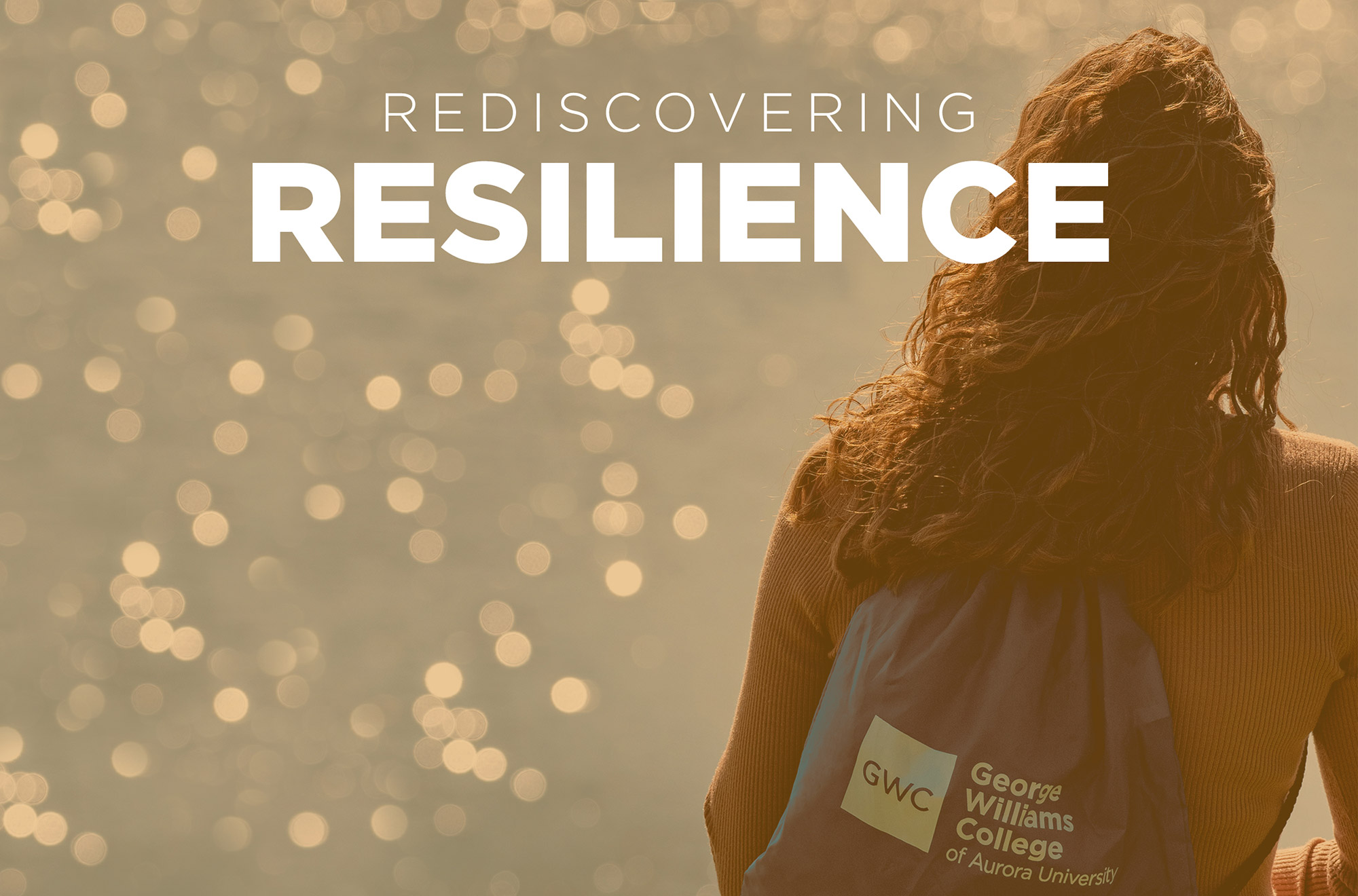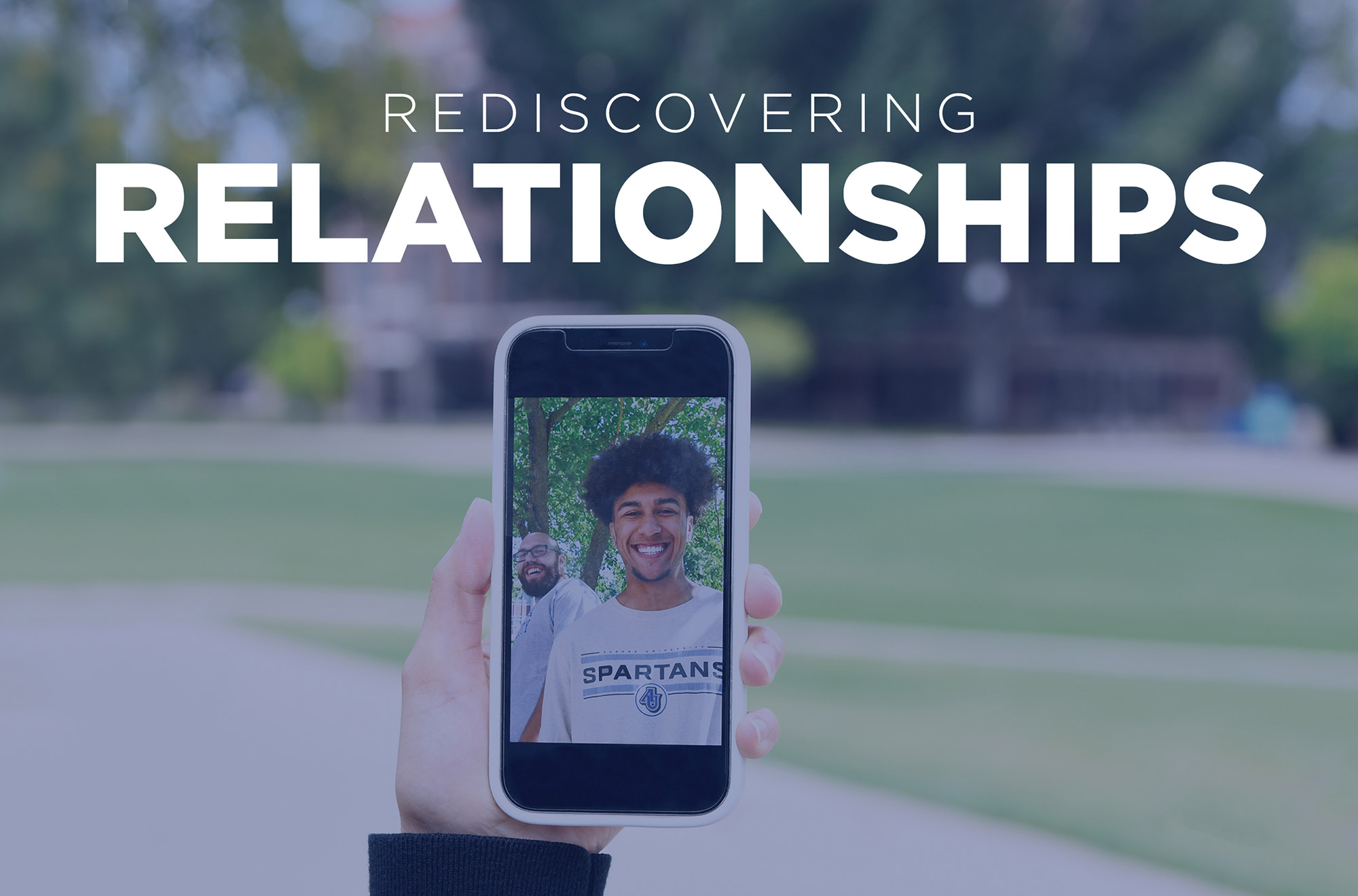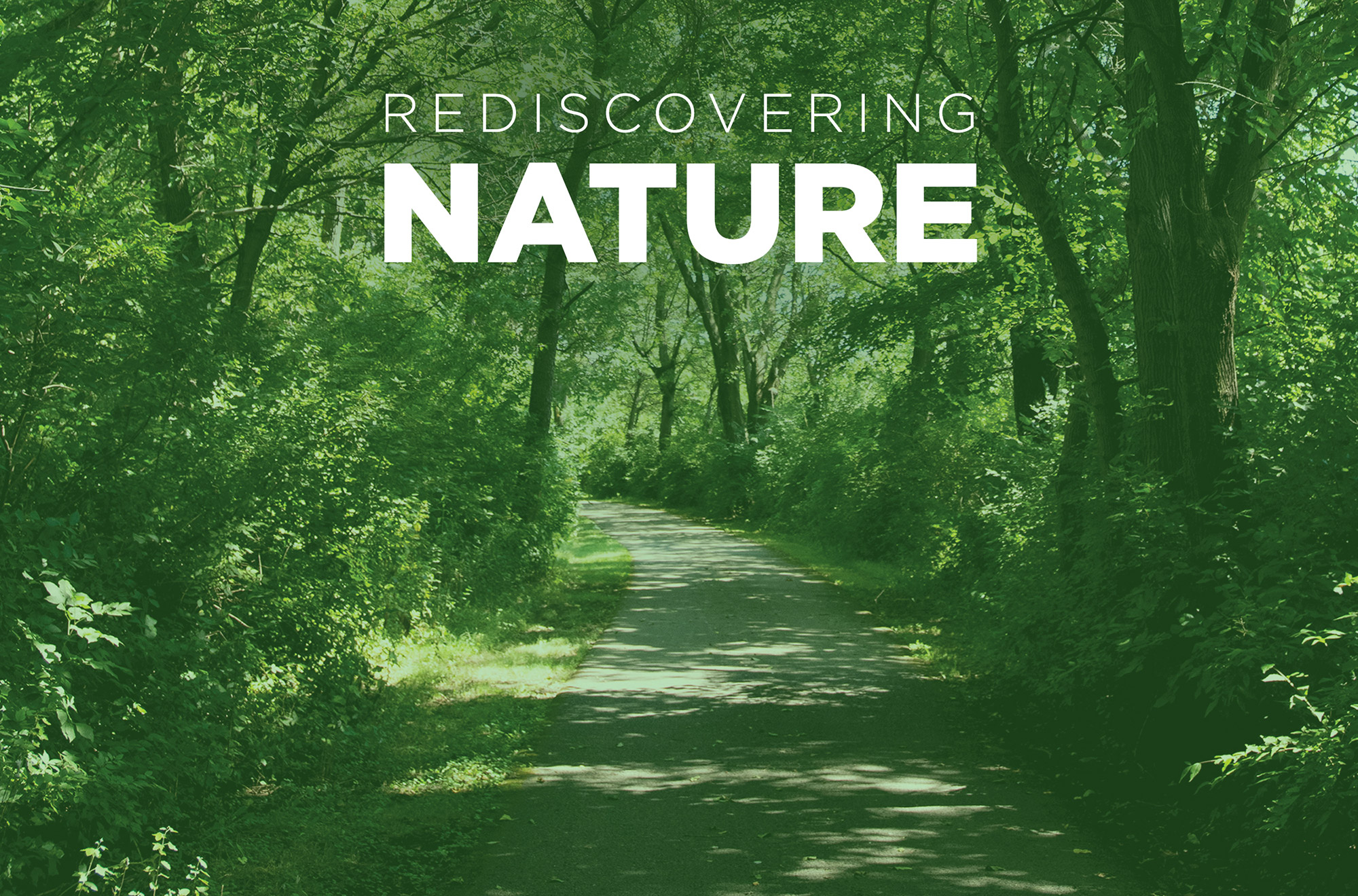Rediscovering What Matters
Lessons from the Pandemic
It’s going to be a very long time before we fully understand the impact of the pandemic — how it’s affecting the world, the Aurora University community, and each one of our lives.
But there’s one thing we know for sure: Life is no longer the same.
Almost two years into the global pandemic, the COVID-19 virus is still with us, and it is changing the way we live, work, shop, study, worship, travel, communicate, and socialize. The pandemic isn’t over. But has it taught us anything?
We at AU are experts at discovering what matters and building our lives around it. So, we asked you — AU alumni, faculty, staff, and students — to share how this historic event has prompted you to take a fresh look at life and rediscover what matters. What are the lessons worth remembering? What new discoveries are you taking with you into the future? Here is what you had to say.

Lesson: Everyone struggles with fear and anxiety at one time or another. The global pandemic revealed how important it is to pay attention to mental health, especially when coping with uncertainty and disruption in our daily lives.
The pandemic reminded us that life is uncertain and unpredictable. It rattled our lives in countless ways. Many AU community members faced setbacks, but also discovered new purpose and hope.
Christopher Samp MSW ’17 was serving as a teacher in the Peace Corps in Ethiopia in March 2020 when the pandemic hit and all volunteers were ordered to go home. Samp had to cancel his school development project and return the $5,000 he had raised for the program.
“The forced evacuation took all that effort and planning and reduced it to ashes,” said Samp. “It was a very difficult time for me as I realized the full range of consequences COVID-19 meant for me personally and professionally.”
But after a few months, Samp said he “got tired of moping.” He drew upon the lessons he had learned in perseverance as a student in AU’s Master of Social Work program and from his Christian faith, and he created new goals. Soon he discovered a teaching opportunity in Somalia, and this past summer moved to Honduras, where he is a language arts instructor at a bilingual school.
“The main lesson I’ve learned during COVID-19 is that circumstances are often unkind to our plans,” said Samp, “but if we choose to press ahead, they are never unkind to our development.”
Renewed Focus on Mental Health
Since the onset of COVID-19, about 40% of adults in the U.S. have reported symptoms of anxiety disorder and/or depressive disorder, a fourfold increase from before the pandemic, according to the Kaiser Family Foundation, a nonprofit focusing on national health issues.
Margaret Grau ’77 GWC, a licensed clinical social worker, said she has “never felt more relevant and useful than in this past year.” Demand for services rose beyond her capacity, and she had to refer many new clients to other service providers.
“The biggest rediscovery the pandemic has forced is the understanding of the overall importance of mental health,” said Brenda Barnwell, dean of the School of Social Work. “We really started to embrace mental health in our communities and let go of stigmas.”
At AU’s School of Social Work, the pandemic has sparked new curriculum across undergraduate and graduate programs. Students are learning how to navigate telehealth and how to get certified in the new field of telehealth services. Courses have also been expanded to teach how to assess social issues related to COVID-19 and how to address the barriers to accessing mental health resources — a gap that the pandemic has brought to light.
Finding New Purpose
Brian Hamilton ’69 GWC had thought about becoming a minister early in his life, but focused on his business career instead. The pandemic changed his perspective. As COVID-19 began to take its toll on his fellow church members, Hamilton decided to go through the 50-hour training to become a Stephen Minister. The nonprofit Christian educational organization trains lay church members on how to care for and counsel people in their congregation and community who are going through difficult times.
“Our church has suffered so many deaths during the pandemic, but many survivors have not had an opportunity to grieve their losses,” said Hamilton, who was commissioned as a Stephen Minister in May 2021. “I am coleading a grief support group, and I look forward to serving as a caregiver for the remaining years of my life.”
For Gavin Withaeger ’22, a Nursing major and long-distance runner, going through the pandemic has taught him how to take life’s setbacks in stride. He was just starting to get comfortable with public speaking when COVID-19 hit and he “got knocked back about 10 steps.” The experience reminded him that progress isn’t always linear.
“Resilience is the key word,” said Withaeger. “We’ve all faced setbacks because of the pandemic. For some people it has been severe, such as losing a family member or losing a job. For other people, it has been minimal things like having their school schedule shaken up. We’ve all suffered a loss in some way. It’s about how we’ve bounced back, developed grit, and kept showing up, even when it was hard.”

Lesson: Human beings need each other. We all knew this, but the pandemic has brought this truth into sharper focus. More than any other lesson, this is the one that resonates most deeply.
The pandemic reshaped our relationships — at home, with friends, and at work. The isolation of the early days of the shelter-in-place orders, the loss of loved ones to COVID-19, and the uncertainty of the future prompted many people to reevaluate their priorities and make more time for friends and family.
“Connecting with people has become more important because we were separated from loved ones,” said Mark Woolfington, university chaplain at the Wackerlin Center for Faith and Action. “These are themes I’ve heard a lot during the pandemic — the importance of family and the longing for connection.”
Zoom became a household word and changed the nature of work and family gatherings, allowing people across distances to meet virtually. Some took the opportunity to reconnect with old friends. Others said they became more forgiving and compassionate.
For Napoleon Ebot ’20, a second lieutenant in the U.S. Marine Corps, the pandemic changed his perspective.
“I realized I had my priorities all wrong,” said Ebot. “I only focused on performing well at work and at school. I didn’t have time for anything else; rather, I never made time for anything else. When COVID-19 struck, I made more time to talk to my friends and family and to rekindle relationships. Now I talk to my family and friends every day, even though I have moved far away. I make sure they know their importance to me.”
Ryan Roberts ’20 moved to Houston the summer after graduation to start his career in business. He didn’t know anyone, and the pandemic restrictions meant he spent most of his time alone in his apartment.
“It was a very hard adjustment to make,” said Roberts. “I learned the hard way that we can’t do everything on our own. I discovered that in order for me to become my best self, I need to surround myself with people who care about me and who lift me up when I’m not at my best. I reconnected with my two best friends that I met at AU, and I became closer with my parents than I have ever been, even though I live many hours away from them.”
Dog Days
Roberts also got an emotional boost when he rescued a Labrador retriever named Bo, “the most awesome companion I’ve seen,” he said. Roberts joined a deluge of Americans adopting pets as the COVID-19 social distancing restrictions took hold.
Animal shelters, breeders, and pet stores across the nation reported a rise in consumer demand for pets shortly after the onset of the pandemic. The surge was so dramatic that Time magazine named “Rescue Animals” its “2020 Pet of the Year.”
Veterinarian Jane Davis, professor of biology and chair of human-animal studies, isn’t surprised that so many people rediscovered the joy of pet ownership. Pets enlarge our lives, she said, especially when our world seems to be shrinking.
“One of the things I enjoy most about veterinary medicine is not only how people are connected to their animals, but how animals connect people to each other,” said Davis. “A lot of people were isolated during the pandemic. Getting up and walking the dog and meeting other dog owners in the street or in the park gave us all a connection.”
Windows Into the World
We also discovered new ways to make connections. Professor of Chemistry and Smith Distinguished Chair of Physical Sciences Chetna Patel found that holding Zoom meetings when classes went remote allowed her new insights into her students’ lives. She plans to continue to rely on Zoom after the pandemic has subsided.
“It has been wonderful to connect with my students on Zoom and to have them invite me virtually into their homes,” said Patel. “They have shared glimpses of their pets and their families. It has allowed me to learn so much about what matters to my students.”
Still, for all its benefits, there are times when a Zoom meeting isn’t enough. Eduardo Mendoza ’15, a sales manager at Caterpillar Inc. in Denver, rediscovered how important face-to-face meetings are in business, especially in sales.
“In my line of work, we have a saying, ‘We are in the relationship business; build it and the rest will come,’” said Mendoza. “This was evident during the pandemic. We missed the travel, the lunches, the customer events, but more importantly, we missed the relationship-building aspect with new and existing customers.”
Becca Flaminio, executive assistant to the president, said the pandemic allowed her the time at home to see more deeply into the life of her 5-year-old autistic son.
“At times, I was working with therapists via telehealth to help provide needed services to him. But mostly, I was just observing him and his beautiful way of seeing the world,” said Flaminio. “I am so grateful for what the pandemic gave me. It gave me a window into my son that I am not sure would have opened without this pause in the world.”

Lesson: There’s nothing like a walk outside to clear your head. Nature has the power to heal, to restore, to reinvigorate. And we don’t have to travel far to find it.
The great American naturalist John Muir understood the power of nature to “heal and give strength to body and soul.”
The simple act of putting one foot in front of the other along a prairie path or a forest trail quiets the mind and reduces stress. It’s a fact that Chris Wells, chair and associate professor of parks and recreation leadership, understands well.
“In the early days of the pandemic, we were all cooped up at home due to the shelter-in-place orders,” said Wells. “Being around people is so important for our health. Nature was one of the places where it was relatively safe to get together.”
The upheaval of the pandemic sent a record number of Americans outdoors last year. The Outdoor Industry Association reported that 8.1 million more Americans went hiking in 2020 versus 2019, and 7.9 million more went camping.
The national parks, already struggling with crowds before the pandemic, experienced a new crush of tourists. Yellowstone National Park recorded its highest number of monthly visitors this past May, and many national parks have been so deluged with visitors rediscovering the outdoors that they are requiring reservations.
Even as the national parks beckoned, many members of the AU community discovered inspiring nature walks closer to home and made outdoor treks part of their daily routines. There are more than 700 miles of trails in Illinois and more than 2,500 miles of trails in Wisconsin. Kane County alone has 23,000 acres of woodlands, wetlands, and prairies.
Taking a Second Look
Katie Blair ’22, a Parks and Recreation major who interned at the Forest Preserve District of DuPage County this past summer, said the pandemic opened her eyes to the unusual wildlife in her own backyard.
“Many people like to say you should go out West and see Zion National Park or one of the national parks, and that’s true, but people forget that our state has a lot to offer,” said Blair. “I learned about all these endangered nesting birds in Illinois and certain species of plants that are invading the native plants. I wouldn’t have known these things if it weren’t for the pandemic. It makes you take a second look.”
Likewise, Bela (Bill) Suhayda ’73, a retired high school science teacher, said the pandemic prompted him to observe nature in a new way. He and his wife, Brenda, took long walks outside, slowing down and looking closely at the natural world around them.
“We took pictures of how the forest changed from early March through later spring, summer, and finally fall and winter,” said Suhayda. “Even though I taught biology for years, I hadn’t quite learned to appreciate the beauty the sunshine creates in late spring and summer, and the glorious colors of fall.”
Professor of Spanish and Chair of Foreign Languages Denise Hatcher took up walking when the pandemic started and soon discovered local hiking paths not far from Aurora that she hadn’t known existed.
“We discovered Big Rock Forest Preserve, and I love it,” said Hatcher. “My favorite is the Bliss Woods Forest Preserve section of the Virgil Gilman Trail. The trees are so majestic. I love to learn about new places to explore. It’s a habit I plan to continue.”
As for Wells, he teaches his students about finding the balance between enjoying outdoor spaces for recreation and protecting the environment. He has taken his students to restoration projects across the country — from building and maintaining the 1,200-mile Ice Age National Scenic Trail in Wisconsin to restoring coral reefs in the shallow waters of Key Largo, Florida.
“I am so hopeful that people develop a fondness for nature — not only as individuals, but as a society,” said Wells, “and that we don’t just go back to our old habits once the pandemic is over. My great hope is that it will stick.”
Rising Above the Pandemic
The pandemic has forced universities and colleges around the world to adapt. At AU, a tradition of discipline, agility, and compassion has allowed the university not only to survive the challenges, but to thrive.
While keeping classes operating and students and faculty safe, AU moved forward with bold plans to open a new School of Health Science, launch the new Pathways initiative to serve college-bound students on the autism spectrum, expand career services, and connect students with alumni across a variety of professions.
It is through the invigorating interplay between excellent teachers, eager students, engaged alumni, and caring community that AU continues to rise above unprecedented circumstances and support a new generation of young people in their quest to fulfill their aspirations and shine a light in the world.